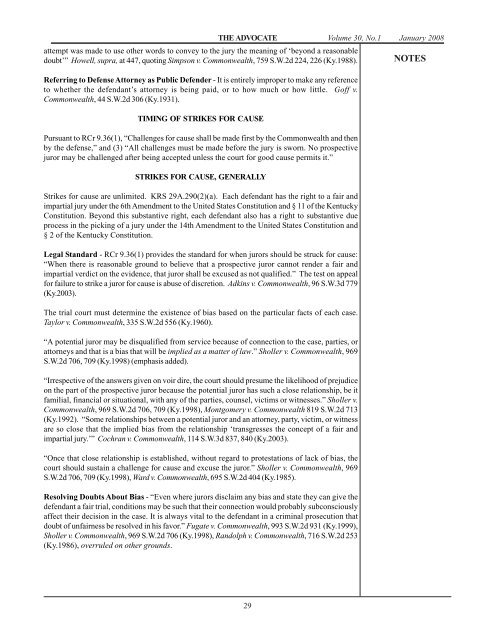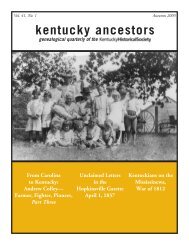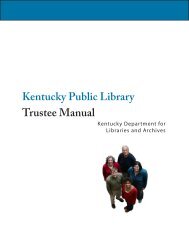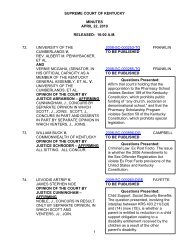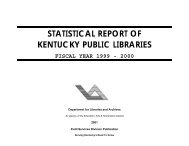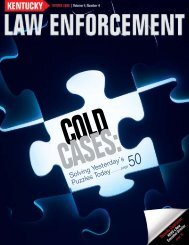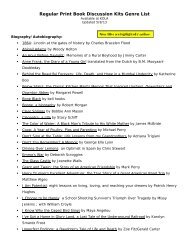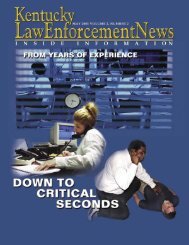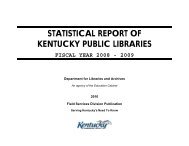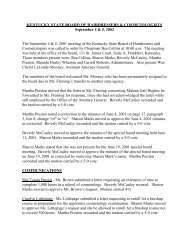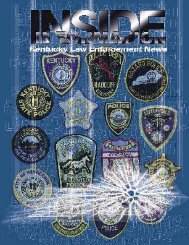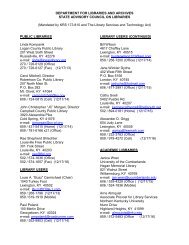Jan08 Advo.pmd - e-archives Home
Jan08 Advo.pmd - e-archives Home
Jan08 Advo.pmd - e-archives Home
You also want an ePaper? Increase the reach of your titles
YUMPU automatically turns print PDFs into web optimized ePapers that Google loves.
THE ADVOCATE Volume 30, No.1 January 2008<br />
attempt was made to use other words to convey to the jury the meaning of ‘beyond a reasonable<br />
doubt’” Howell, supra, at 447, quoting Simpson v. Commonwealth, 759 S.W.2d 224, 226 (Ky.1988).<br />
Referring to Defense Attorney as Public Defender - It is entirely improper to make any reference<br />
to whether the defendant’s attorney is being paid, or to how much or how little. Goff v.<br />
Commonwealth, 44 S.W.2d 306 (Ky.1931).<br />
TIMING OF STRIKES FOR CAUSE<br />
Pursuant to RCr 9.36(1), “Challenges for cause shall be made first by the Commonwealth and then<br />
by the defense,” and (3) “All challenges must be made before the jury is sworn. No prospective<br />
juror may be challenged after being accepted unless the court for good cause permits it.”<br />
STRIKES FOR CAUSE, GENERALLY<br />
Strikes for cause are unlimited. KRS 29A.290(2)(a). Each defendant has the right to a fair and<br />
impartial jury under the 6th Amendment to the United States Constitution and § 11 of the Kentucky<br />
Constitution. Beyond this substantive right, each defendant also has a right to substantive due<br />
process in the picking of a jury under the 14th Amendment to the United States Constitution and<br />
§ 2 of the Kentucky Constitution.<br />
Legal Standard - RCr 9.36(1) provides the standard for when jurors should be struck for cause:<br />
“When there is reasonable ground to believe that a prospective juror cannot render a fair and<br />
impartial verdict on the evidence, that juror shall be excused as not qualified.” The test on appeal<br />
for failure to strike a juror for cause is abuse of discretion. Adkins v. Commonwealth, 96 S.W.3d 779<br />
(Ky.2003).<br />
The trial court must determine the existence of bias based on the particular facts of each case.<br />
Taylor v. Commonwealth, 335 S.W.2d 556 (Ky.1960).<br />
“A potential juror may be disqualified from service because of connection to the case, parties, or<br />
attorneys and that is a bias that will be implied as a matter of law.” Sholler v. Commonwealth, 969<br />
S.W.2d 706, 709 (Ky.1998) (emphasis added).<br />
“Irrespective of the answers given on voir dire, the court should presume the likelihood of prejudice<br />
on the part of the prospective juror because the potential juror has such a close relationship, be it<br />
familial, financial or situational, with any of the parties, counsel, victims or witnesses.” Sholler v.<br />
Commonwealth, 969 S.W.2d 706, 709 (Ky.1998), Montgomery v. Commonwealth 819 S.W.2d 713<br />
(Ky.1992). “Some relationships between a potential juror and an attorney, party, victim, or witness<br />
are so close that the implied bias from the relationship ‘transgresses the concept of a fair and<br />
impartial jury.’” Cochran v. Commonwealth, 114 S.W.3d 837, 840 (Ky.2003).<br />
“Once that close relationship is established, without regard to protestations of lack of bias, the<br />
court should sustain a challenge for cause and excuse the juror.” Sholler v. Commonwealth, 969<br />
S.W.2d 706, 709 (Ky.1998), Ward v. Commonwealth, 695 S.W.2d 404 (Ky.1985).<br />
Resolving Doubts About Bias - “Even where jurors disclaim any bias and state they can give the<br />
defendant a fair trial, conditions may be such that their connection would probably subconsciously<br />
affect their decision in the case. It is always vital to the defendant in a criminal prosecution that<br />
doubt of unfairness be resolved in his favor.” Fugate v. Commonwealth, 993 S.W.2d 931 (Ky.1999),<br />
Sholler v. Commonwealth, 969 S.W.2d 706 (Ky.1998), Randolph v. Commonwealth, 716 S.W.2d 253<br />
(Ky.1986), overruled on other grounds.<br />
29<br />
NOTES


